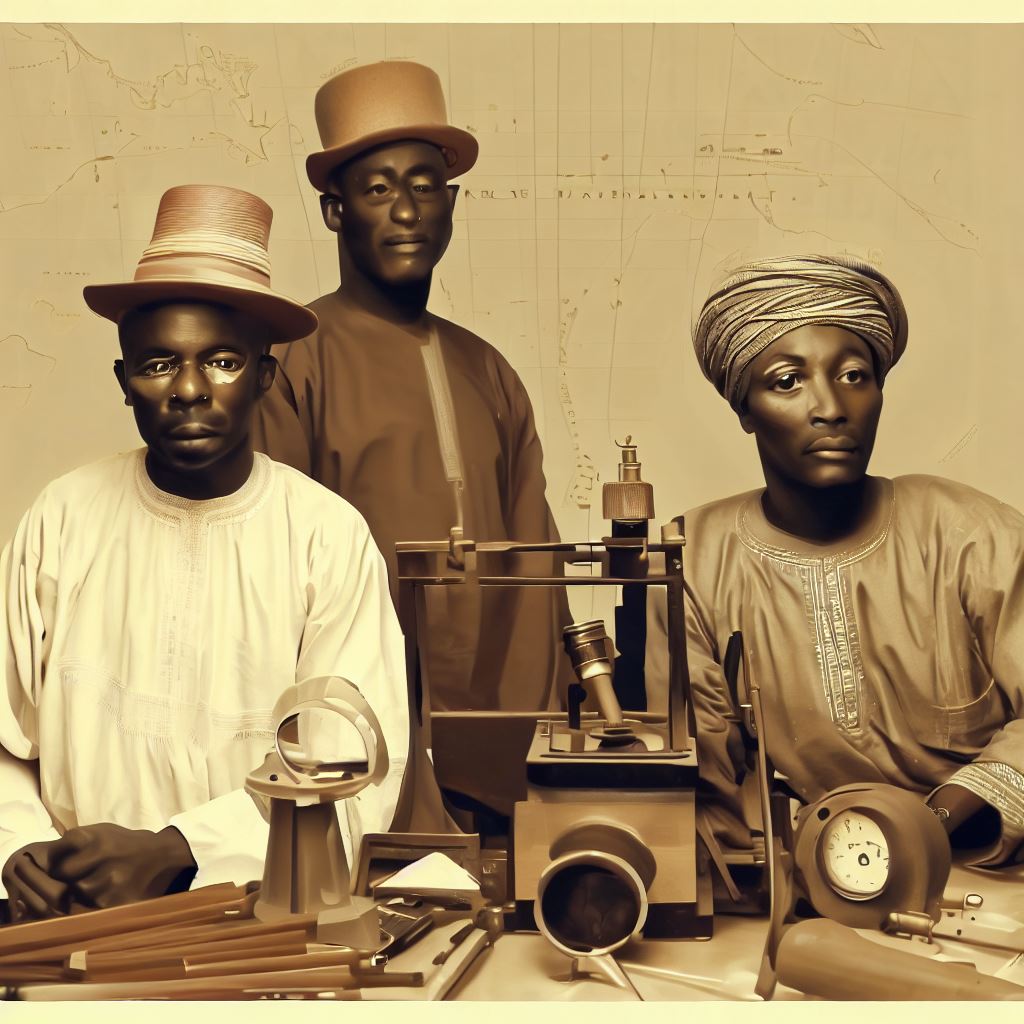Introduction
Embarking on a journey to become a Cartographer in Nigeria? Discover invaluable tips and tricks in our blog post.
We will discuss the process of finding work as a cartographer in Nigeria.
Finding work as a cartographer in Nigeria is crucial as it can help contribute to the country’s development.
The thesis statement of this blogpost is to provide tips and tricks for successfully finding work as a cartographer in Nigeria.
Importance of finding work as a cartographer in Nigeria
Finding work as a cartographer in Nigeria is not an easy task, but it is definitely worth the effort.
Cartographers play a vital role in mapping out the physical and cultural landscapes of a region, which is essential for various industries such as urban planning, navigation, and disaster management.
In Nigeria, where rapid urbanization and infrastructure development are taking place, the demand for skilled cartographers is high.
To successfully find work as a cartographer in Nigeria, you need to have the right qualifications and skills.
A bachelor’s degree in cartography or a related field is typically required.
Thesis statement
Additionally, having knowledge of geographic information systems (GIS) and remote sensing technologies is highly beneficial.
Networking is a valuable tool when searching for job opportunities in Nigeria.
Attend seminars, conferences, and professional events related to cartography to connect with industry professionals and potential employers.
Building relationships with local government agencies, research institutions, and private companies can also open doors to job opportunities.
Utilizing online job portals and social media platforms can also be advantageous.
Many organizations in Nigeria advertise job vacancies online, so regularly checking these platforms can potentially lead to job leads.
Additionally, showcasing your work and skills through a personal website or online portfolio can make you stand out from other applicants.
In review, finding work as a cartographer in Nigeria requires a proactive approach.
By having the right qualifications, networking, and utilizing online resources, you can increase your chances of securing a job in this field.
Remember to stay determined, keep improving your skills, and adapt to the changing needs of the industry.
With persistence and dedication, you can find rewarding work as a cartographer in Nigeria.
Understanding the Role of a Cartographer
Definition and responsibilities of a cartographer
- A cartographer is a professional who creates and interprets maps.
- The role of a cartographer includes collecting, analyzing, and interpreting geographic data.
- They use specialized software and tools to design accurate and visually appealing maps.
- Cartographers also conduct research to update and improve existing maps.
- They collaborate with other professionals, such as geographers and surveyors, to gather data and create comprehensive maps.
Importance of cartography in various industries
- Cartography plays a crucial role in urban planning and development.
- It provides valuable information for infrastructure projects, such as roads, bridges, and buildings.
- In environmental management, cartography helps in mapping ecosystems and monitoring changes in natural resources.
- Cartographers contribute to disaster management by creating maps that assist in emergency response and evacuation plans.
- In the field of navigation, cartography is essential for creating accurate and detailed nautical and aeronautical charts.
Skills and qualifications required to become a cartographer
- A strong background in geography, geomatics, or a related field is typically required.
- Proficiency in cartographic software, such as ArcGIS or QGIS, is essential for creating maps.
- Knowledge of remote sensing and geographic information systems (GIS) is important.
- Attention to detail and strong analytical skills are necessary for interpreting complex data.
- Good communication and collaboration skills are valuable for working with other professionals and clients.
- A bachelor’s or master’s degree in cartography, geography, or a related field is usually required.
- Continuing education and staying updated with advancements in technology and mapping techniques is important for career growth.
In essence, a cartographer is a professional responsible for creating and interpreting maps.
Their role is crucial in various industries, including urban planning, environmental management, and navigation.
To become a cartographer, one needs a strong background in geography, proficiency in cartographic software, and knowledge of remote sensing and GIS.
Attention to detail, analytical skills, and good communication are also important.
Obtaining a relevant degree and staying updated with advancements in the field are key for a successful career in cartography
Read: Top Universities for Statistics Studies in Nigeria
Researching the Job Market in Nigeria
Overview of the cartography job market in Nigeria:
- Cartography is a niche field in Nigeria, with a limited number of opportunities available.
- Most cartographers in Nigeria are employed by government agencies, such as the National Mapping Agency.
- There are also opportunities in private companies that offer mapping and geospatial services.
Industries and sectors that hire cartographers:
- Government agencies: The government is the largest employer of cartographers in Nigeria, with openings in various ministries and agencies.
- Oil and gas industry: Cartographers are in high demand in the oil and gas sector for mapping and exploration purposes.
- Environmental organizations: NGOs and environmental organizations hire cartographers for environmental mapping and conservation projects.
Growth prospects and demand for cartographers in Nigeria:
- The demand for cartographers in Nigeria is increasing due to the country’s rapid urbanization and infrastructure development.
- There is a growing need for accurate and up-to-date maps for urban planning, transportation, and natural resource management.
- Advancements in technology, such as Geographic Information Systems (GIS), have also increased the demand for skilled cartographers.
Above all, while the job market for cartographers in Nigeria may be limited, there are still opportunities available in government agencies, private companies, and various industries.
The demand for cartographers is expected to grow in the coming years, driven by Nigeria’s urbanization and infrastructure development.
Aspiring cartographers should focus on developing their skills in GIS and staying updated with the latest mapping technologies to enhance their job prospects.
Read: In Demand: How Statisticians Shape Nigerian Policies
Developing Essential Skills and Qualifications
Formal education requirements for becoming a cartographer in Nigeria.
- Obtain a bachelor’s degree in cartography, geomatics, geography, or a related field.
- Look for universities or colleges that offer courses specifically focusing on cartography and GIS.
- Ensure the program is accredited by a recognized educational body or institution in Nigeria.
- Gain a solid understanding of mathematics, statistics, computer science, and physical geography.
- Develop excellent research and analytical skills, as well as strong attention to detail.
Additional certifications and training opportunities.
- Consider obtaining certifications from professional organizations such as the Nigerian Institution of Surveyors (NIS) or the Nigerian Geographical Association (NGA).
- Look for specialized training programs or workshops that focus on advanced GIS software and mapping techniques.
- Attend conferences or seminars related to cartography to stay updated on the latest technologies and practices.
- Participate in online courses or webinars offered by reputable institutions or organizations.
Technical skills required for cartography in Nigeria.
- Proficiency in Geographic Information System (GIS) software such as ArcGIS, QGIS, or GeoServer.
- Mastery of remote sensing techniques and interpretation of satellite imagery.
- Strong knowledge of various map projections, coordinate systems, and spatial data analysis.
- Ability to use Global Positioning System (GPS) devices for data collection and fieldwork.
- Familiarity with CAD software to create and edit digital map files.
- Understanding of database management systems and data manipulation using SQL.
- Knowledge of programming languages like Python, R, or JavaScript for automating processes and developing custom tools.
- Excellent visual communication skills to effectively present data and information through maps and visualizations.
- Familiarity with surveying equipment and techniques for accurate data collection.
Developing vital skills and qualifications for a successful cartography career in Nigeria is paramount.
A bachelor’s degree in cartography or related fields is the initial stepping stone, offering a comprehensive understanding of the discipline.
Choosing a reputable institution with tailored cartography and GIS courses is equally crucial.
Further qualifications involve acquiring certifications, like those from professional bodies like the Nigerian Institution of Surveyors (NIS) or the Nigerian Geographical Association (NGA).
Attending specialized programs, workshops, or webinars keeps cartographers updated on evolving technologies.
Technical prowess is indispensable. Proficiency in GIS software (e.g., ArcGIS, QGIS, GeoServer), remote sensing, CAD, and database management, combined with programming skills, streamlines data handling and automation.
Effective visual communication, encompassing map projections, coordinate systems, and spatial analysis, is key.
Familiarity with surveying equipment ensures precise field data collection.
In summary, aspiring Nigerian cartographers must acquire formal education, seek certifications, enhance technical skills, and refine visual communication abilities.
Continuous improvement ensures success and contributes to the field’s growth in Nigeria.
Read: The Impact of Technology on Actuary Jobs in Nigeria: Analysis

Networking and Building Professional Connections
Importance of networking in the cartography field
- Networking is crucial for cartographers to expand their professional connections and open doors for career opportunities.
- Through networking, cartographers can learn about job vacancies, projects, and collaborations within the industry.
- Building a strong network allows cartographers to stay updated on the latest trends, technologies, and techniques in cartography.
- Networking also provides a platform for sharing knowledge, experiences, and best practices with fellow cartographers.
- By connecting with professionals in the field, cartographers can gain valuable insights and mentorship from experienced individuals.
Joining industry-related associations and organizations
- Joining cartography associations and organizations provides access to a community of professionals who share similar interests and goals.
- These associations offer networking opportunities through meetings, events, and online platforms.
- Membership in such organizations enhances credibility and demonstrates commitment to the field.
- Members can participate in discussions, forums, and workshops to exchange ideas and enhance their cartography skills.
- Associations also organize conferences where cartographers can meet potential employers or clients.
Attending conferences, workshops, and seminars
- Attending industry-specific events enables cartographers to network with professionals from different areas of expertise.
- Conferences provide a platform to showcase work, share research findings, and engage in discussions with peers.
- Workshops and seminars offer opportunities to learn new techniques, software, and industry advancements.
- These events often feature renowned speakers and presenters who can inspire and educate cartographers.
- Contact information exchanges during such events can lead to future collaborations or job opportunities.
Ultimately, networking and building professional connections are crucial aspects of finding work as a cartographer in Nigeria.
By actively participating in industry-related associations, organizations, and events, cartographers can expand their network, stay updated on industry trends, and access career opportunities.
Networking provides avenues for collaboration, skill enhancement, and mentorship, ultimately helping cartographers thrive in their careers.
Read: Challenges Faced by Statisticians in Nigeria Today
Utilizing Online Resources and Job Portals
Exploring online platforms for job search in Nigeria
- Check popular job websites like Jobberman, NGCareers, and Indeed Nigeria for cartography-related openings.
- Be proactive and regularly check these platforms for new job listings in your desired field.
- Utilize the advanced search options offered by these websites to filter job opportunities based on location, experience, and salary.
Navigating specific job portals for cartographers
- Look out for specialized job portals like GIS Jobs Nigeria and Geojobs NG that specifically cater to cartography professionals.
- These portals often have a higher concentration of relevant job listings tailored to your skills and expertise.
- Subscribe to their mailing lists or set up job alerts to stay updated with the latest cartography job openings.
Creating an impressive online portfolio or website
- Develop a visually appealing and user-friendly online portfolio showcasing your previous cartography projects and achievements.
- Include relevant details, such as your educational background, certifications, and specialized skills in cartography.
- Use your online portfolio or website as a platform to demonstrate your expertise and attract potential employers.
In the digital age, utilizing online resources and job portals is crucial for finding work as a cartographer in Nigeria.
Explore popular job websites, such as Jobberman and NGCareers, regularly to stay up-to-date with available opportunities.
Additionally, consider leveraging specialized job portals like GIS Jobs Nigeria and Geojobs NG for a more targeted search.
Lastly, create an impressive online portfolio or website to showcase your skills and attract potential employers.
By utilizing these online resources and presenting yourself effectively, you can increase your chances of finding rewarding cartography work in Nigeria.
Explore Further: Networking Tips for Biostatisticians in Nigeria
Crafting an Effective Cartographer Resume and Cover Letter
Tailoring your resume to stand out for cartography positions
- Start by carefully reading the job description and understanding the requirements.
- Highlight your cartography and GIS skills and experience that align with the specific role.
- Showcase any relevant certifications, such as GIS Professional (GISP) or Certified Cartographer (CC).
- Include a concise summary or objective statement at the beginning of your resume.
- Use clear, concise bullet points to outline your professional experience and accomplishments.
- Incorporate keywords from the job description throughout your resume to stand out to hiring managers.
- Customize your resume for each job application to emphasize the most relevant skills and experience.
Highlighting relevant experience and skills in the cover letter
- Address the cover letter to the hiring manager or relevant contact person, if possible.
- Start with a compelling opening paragraph that grabs the reader’s attention and shows your enthusiasm.
- Describe specific examples of your cartography experience and accomplishments.
- Emphasize how your skills and expertise align with the requirements of the job.
- Highlight any additional relevant skills, such as proficiency in GIS software or data analysis.
- Showcase your ability to work collaboratively, solve problems, and effectively communicate complex information.
- Include a closing paragraph expressing your interest in the position and availability for an interview.
Tips for showcasing your portfolio and past projects
- Create a digital portfolio that highlights your best cartography work.
- Showcase a variety of projects, including maps, data visualizations, and spatial analysis.
- Include descriptions of each project, explaining your methodology and the insights gained.
- Organize your portfolio in a clear and visually appealing manner.
- Consider using interactive maps or multimedia elements to enhance the viewer’s experience.
- Provide links to your portfolio in your resume or cover letter for easy access by employers.
- Regularly update your portfolio with new projects and remove outdated or less impressive work.
By tailoring your resume, highlighting relevant experience and skills in your cover letter, and showcasing your portfolio, you can craft an effective job application that stands out among other cartographers.
Preparing for Cartographer Interview
Researching the potential employer and their projects
- Start by conducting thorough research on the potential employer.
- Find out about the projects they have worked on in the past.
- Understand their mission, values, and the type of cartography they specialize in.
- Gather information about their clients and the industries they serve.
- Explore their website, social media accounts, and any available publications.
Common interview questions for cartographer positions
- Prepare for common interview questions that are frequently asked for cartographer positions.
- Anticipate questions about your experience in cartography and technical skills.
- Be ready to explain how you have used different mapping tools and software.
- Expect questions about problem-solving, attention to detail, and data analysis abilities.
- Be prepared to discuss your knowledge of geographic information systems (GIS) and remote sensing.
- Practice answering questions about your ability to work in a team and meet deadlines.
Showcasing your expertise and passion for cartography
- During the interview, highlight your expertise in cartography and related skills.
- Explain how your previous work experience aligns with the specific needs of the employer.
- Show enthusiasm and passion for cartography by sharing your favorite projects or achievements.
- Discuss your ability to interpret and analyze geographical data accurately.
- Mention any certifications, courses, or workshops you have attended to enhance your cartography skill
- Illustrate your adaptability and willingness to learn new technologies and techniques.
Overall, preparing for a cartographer interview requires in-depth research, anticipation of common questions, and a genuine display of expertise and passion for cartography.
Use the opportunity to showcase your skills, knowledge, and dedication to the field, and make a lasting impression on potential employers.
Conclusion
Finding work as a cartographer in Nigeria is crucial for both personal and professional growth.
In summary, we have discussed valuable tips and tricks to help you navigate the job market.
To all aspiring cartographers in Nigeria, stay motivated and believe in your abilities – the opportunities are waiting for you!
Importance of Finding Work as a Cartographer in Nigeria
- Cartographers play a vital role in urban planning, disaster management, and resource allocation.
- Their work impacts sustainable development and decision-making in Nigeria.
Tips and Tricks for Success:
- Network actively within the cartography community.
- Showcase a diverse portfolio of map-making skills.
- Stay updated with the latest GIS and mapping technologies.
- Seek internships or freelance opportunities.
- Embrace continuous learning and adaptability.
Encouragement for Aspiring Cartographers:
- The journey may be challenging, but your skills are in demand.
- Nigeria’s mapping industry is evolving; your contribution matters.
- Keep honing your craft and pursuing your passion—success awaits.
In your cartography career, persistence and skill development will open doors to exciting opportunities. Stay motivated!




